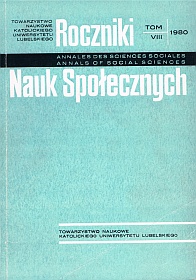Koncepcje rozwoju ekonomicznego i ich ocena
Abstrakt
The problem of developing countries has brought into focus the question of economic development, both in economic policy and in economic theory. Three terms are used in economics in this connection: growth, development, progress. The first of these depends on purely economic factors, the second is broader and concerns the economic and social spheres, and the last, the broadest one, is related to human culture as a whole. But in actual fact the three terms are often used interchangeably and are not defined accurately.
The author gives a historical review of theories of economic growth and development. He thus discusses the neoclassical theories of growth, the equilibrium theory and the cycle theory. He then goes on to contemporary development theories, including W. W. Rostow’s stages theory and J. Schumpeter’s innovation theory.
All theories of unidirectional growth are in fact theories of development. Modern theories of this kind are divided into two currents: theories of balanced growth, which take into account only economic factors and are based on the assumptions of classical theory of economics, and theories of disequilibrium. The latter have been represented by O. Lange among Polish writers and by A. Hirschman in Western Europe. These theories work on the assumption that economic equilibrium becomes a stagnating factor whereas disrupting the equilibrium of an economic system becomes the mainspring of development.
The author pays special attention to the theory of harmonious development first outlined by G. C. Sebregondi, developed by L. J. Lebret and finally, set down in proper scientific form by F. Perroux.
Still, in the author’s opinion, the theory of harmonious development does not provide a solution meeting current needs, because it is limited to purely economic phenomena. That kind of analysis is inadequate for developing countries since their development is conditioned by a broad spectrum of phenomena not only of economic but also of social, political, cultural, moral and even religious nature. The author puts forward a broader conception of a theory of integrated development that would include all social factors affecting economic development.
Copyright (c) 1980 Roczniki Nauk Społecznych

Utwór dostępny jest na licencji Creative Commons Uznanie autorstwa – Użycie niekomercyjne – Bez utworów zależnych 4.0 Międzynarodowe.


